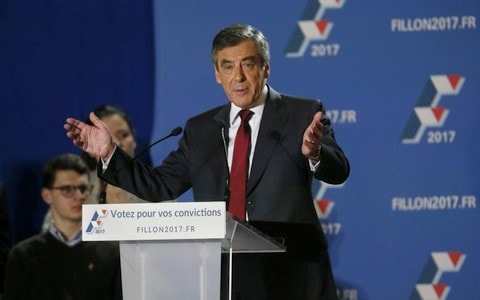Mr. Fillon becomes the leading candidate for the French presidency.
Mr. Francois Fillon continued to win big to officially become the right-wing candidate running for the French presidency in 2017.
If there was anything that was a surprise, it was that Mr. Fillon continued to win by a very large margin against his opponent, Mr. Alain Juppé. The results of the vote count at more than 10,000 polling stations showed that Mr. Fillon won over 67% of the votes compared to over 32% for Mr. Alain Juppé.
 |
| Francois Fillon is emerging as the leading candidate for the French presidency. Photo: AFP |
Although not many people doubted Mr. Fillon's victory after the first round of the election a week ago, this large gap is still a small surprise. In the first round, Mr. Francois Fillon was chosen by 44.1% of French voters, while Mr. Alain Juppé got over 28%.
Analysts this week predict that Mr. Alain Juppé has little chance of narrowing the gap, but also do not dare to boldly predict an overwhelming victory for Mr. Fillon.
With this result, Mr. Francois Fillon officially became the candidate of the right-wing and centrist parties participating in the race for the French presidency in 2017.
And in the comparison of forces between political parties today in French politics, Francois Fillon becomes the leading candidate for the presidency.
For the French right, the first primary election held was a success beyond expectations. Including the two rounds of elections on November 20 and November 27, nearly 9 million French voters of all political orientations went to the polls.
The number of voters in the second round was even higher than the first round, at 4.2-4.5 million voters. This impressive number is very important for the right wing because after the 2012 French presidential election, the right wing was seriously conflicted and at one point was on the verge of breaking up.
The mobilization of nearly 9 million voters in the two rounds of internal elections shows that right-wing parties, with the core being the Republicans (LR) party, still have the ability to attract the French people and will certainly create important political weight in the French presidential election that will take place in 5 months.
However, the end of the primary election also means that the French right must tackle a bigger challenge: healing itself and uniting all right-wing voters around the party's candidate, Francois Fillon.
The recent primary election was seen as a "civil war" of the right wing because the candidates attacked each other fiercely in the debates and the division in views and political lines between the candidates was very clear.
Mr. Francois Fillon’s task, therefore, is to attract voters who once supported Mr. Alain Juppé and Mr. Nicolas Sarkozy to his side. This is not a simple task considering the extremely conservative, liberal and “brutal” election platform of Francois Fillon, especially in the arguments on economic policy (laying off 500,000 civil servants).
However, Francois Fillon also has the advantage of overwhelming victories in both primary election rounds, bringing him great legitimacy and prestige, and facing a great opportunity to regain power from the left, right-wing voters are expected to soon unite to support him.
For the ruling left, the immediate challenge now lies not in Francois Fillon or any other rival but in the selection of candidates, or more precisely in deciding who will run in the left-wing primary election to be held next January.
Unlike the right wing, this is a headache for the left wing because in theory, current President Francois Hollande should be considered a natural candidate to run for re-election, but because Mr. Hollande's reputation is currently very low, the left wing is forced to consider the option of sending other candidates to run for election.
All eyes are now on current Prime Minister Manuel Valls. In an interview with a French newspaper on November 27, Mr. Valls for the first time hinted at the possibility of participating in the left-wing primary, despite having previously remained tight-lipped about the possibility.
In fact, this is not surprising because French politicians believe that Mr. Manuel Valls has been quietly preparing to run for election for many months but is choosing the timing because he wants to avoid attacks as much as possible for betraying President Francois Hollande.
The second big problem for the French left is to get other “liberal” candidates like Jean Luc Melenchon or especially Emmanuel Macron, who calls himself “non-partisan” and has always opposed primaries, to participate in the primary election.
If this call fails, the left will be at risk of being divided into many factions and then the chance of winning the presidential election, which is already very small, will be even smaller.
However, what French left-wing voters are waiting for most in the near future are clear statements about the election intentions of President Francois Hollande and Prime Minister Manuel Valls, which are expected to appear as early as this week.
According to VOV
| RELATED NEWS |
|---|

